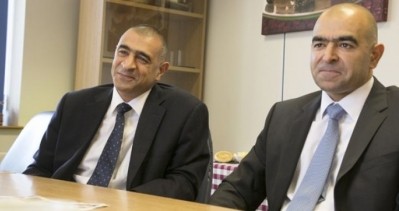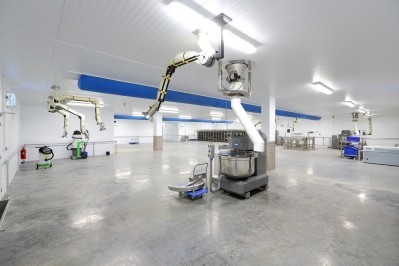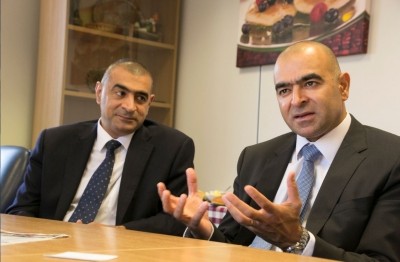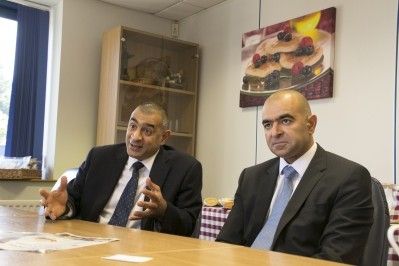Me and my factory
Brothers ... still in naans
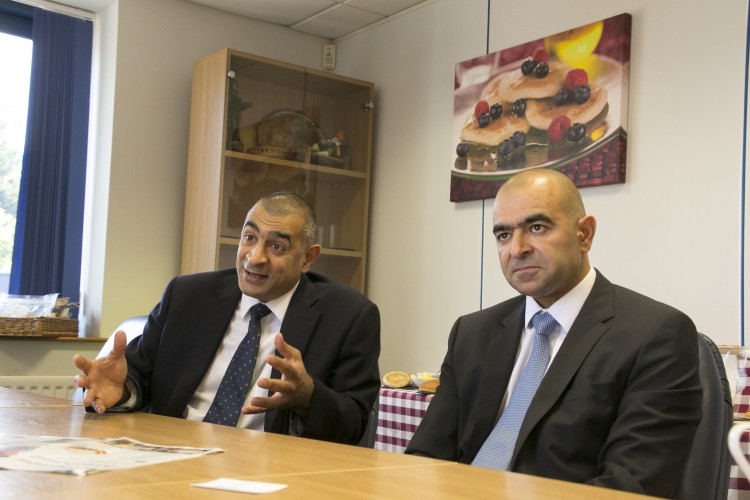
The flatbread market has become mainstream and the category is in significant growth, remarks William Eid. I look after the operational side of Signature Flatbreads while my brother Charles looks after the customers. As a doctor, Charles has a good bedside manner!
In 2000 when Food Manufacture first interviewed us as we headed up Honeytop Speciality Foods, flatbreads were in their infancy and 10 years before that tortillas were nowhere to be seen. We were, in fact, the very first bakery in the UK to bring tortillas to the market.
We define ourselves no longer in categories that are ‘ethnic’. We wouldn’t say we are naan breadmakers any more and we wouldn’t call a tortilla Mexican – it’s a wrap, a sandwich carrier. The consumer is now looking for low calorie, healthy and convenient sandwich carriers.
Signature Flatbreads, which has a turnover of £70M, supplies naan breads, tortilla wraps and breakfast goods such as crumpets and pancakes to all the UK’s major supermarkets made at six production units, occupying in excess of 18,580m2 of land, at an industrial estate in Dunstable.
The company operates seven flatbread lines and five fast tortilla lines, together with morning goods production facilities, which include a high degree of robotics and automation. The company is about to commission a new high volume, flexible 60m long production line, while planning a second line adjacent to it next year, both located in former warehouse space in a £10M investment.
We operate a two 12h shift system from Sunday to Friday, which is a wash-down day, but plan to move to a three eight hour shift system at some point. This can be supported now the minimum wage is going up. Before it couldn’t, as people would leave as they wouldn’t earn enough money without the additional hours.
We employ people from all over the world and we welcome the move to paying a higher minimum wage and moves to a living wage because when you pay reasonable amounts and you are not doing it on your own it leads to a stable workforce and a level playing field.
In 2011 the family felt the business, which was then employing around 600 people, was getting too large to manage. To be honest, Charles and I hadn’t had the experience of running any other medium-sized business other than Honeytop, which was set up in 1984. So we felt the time was right for us to exit before mistakes were made.
India (Return to top)
Aryzta took an interest in the business and that’s when we jumped to India and tried to use some of our experiences there to start up a new business. But it wasn’t easy. India is a difficult place to do business.
However, now that the company in India is stable and expanding rapidly and beginning to receive recognition, things had become easier. Plus, Aryzta was helping us along the way, with things like engineering support and we kept a very close relationship with its senior team.
Meanwhile, Aryzta had increased capacity at Dunstable by investing in two large tortilla lines, installing an SAP enterprise resource planning system, improving perimeter security and taking on more production space. It had also bolstered some of the technical teams.
In November 2014, we were approached by Aryzta, which had transitioned the business from a small to medium-sized operation in infrastructure terms and created the foundation for growth. Aryzta asked us to come back and provide that extra element – our expertise and deep understanding of the flatbread category – to take the business on to the next stage. So, we bought back into the business.
In January we announced we were back in the business and we wanted to take it from £70M to £100M over three years, by investing in capacity, in new products and by bringing new innovations that we have in India back to the UK.
I have been in flatbreads for about 18 years, says Charles, while William has been in it for about 22 years and the drive that a family can bring to a company backed by the systems, structures and resources of a big corporate such as Aryzta means we are in a good position to drive the company forward.
New bakery (Return to top)
We employ about 550 full-time people rising to 600 with temporary staff and have plans to take on another 200 permanent workers over the next two years as the new production lines and associated facilities are commissioned by next April. Since January we have essentially started building a new bakery having sectioned off part of our warehouse. The new line, on which we will be able to make every flatbread except hot-pressed tortillas, is due to start producing on November 19. It will also be capable of making a restaurant-authentic tandoori naan. It will also use some of the know-how we developed in India.
We supply all the major supermarkets and quick service restaurants (QSRs), but from our experience in India, we also want to internationalise the business, exporting to other countries, including the US.
We have a new flatbread, which we expect to launch in the new year. It’s a lower calorie sandwich carrier that has health attributes and was developed at the innovation centre we set up in Hemel Hempstead after leaving the business in 2011. That’s where we also created our restaurant quality naan and various other sandwich carriers.
The new flatbread is not voluminous, so we can ship at very low unit costs. Since Aryzta has an enormous infrastructure in the US, where half its turnover comes from, we are not breaking new ground, just tapping into something that already exists. But it’s not just for the US and will be launched in supermarkets and QSRs in the UK initially, probably in January.
This will be the first of many new products, adds Charles, and we expect to launch up to six ground-breaking new products each year. That’s in addition to product extensions, such as the folded flatbreads we developed with Sainsbury and launched a few months back, which are doing phenomenally well.
Competition (Return to top)
The intense competition between UK supermarkets has forced many suppliers to automate but there is only a certain amount you can do. There has to come a point where the whole value proposition you offer, technical standards, service levels and new developments you bring to the table have to be rewarded. Because if it comes down to price alone, first the fun goes out of it and then we don’t want to sacrifice our values.
Competition is increasing in the UK flatbreads market as it is a growth area, but it is about pushing the quality so we are always ensuring that we are one step ahead of our competitors. The sector requires investment and that is why we are bringing in this new line.
Factory facts (Return to top)
LOCATION: Six production units in Dunstable
STAFF: 550 full time
PRODUCTS: Naans, tortillas, crumpets and pancakes
CUSTOMERS: All major supermarkets and quick service restaurants
TURNOVER: £70M
Personal
NAMES: William (51) and Charles (49) Eid, joint chief executives. Both married with children.
BACKGROUND: Born in Ghana, West Africa, with Lebanese heritage and a baking background. Arrived in the UK in 1982, following a military coup.
OUTSIDE OF WORK: William “very little, I’m a workaholic”. But otherwise, family holidays to far flung places; Charles winemaker with winery in the Lebanon: “I bottled my first vintage a few weeks ago it’s a bit of a passion”
BIGGEST ACHIEVEMENTS: William: “Applying my mechanical engineering skills learned at university to build bespoke equipment”; Charles: “To have worked with William to grow the company to the success it is today”
